
This evening at 5 PM St. John United Church of Christ and PFLAG Kankakee will hold a candlelight prayer vigil for all those affected by the tragedy in Orlando. The church is located at 1045 W. River Street. Please spread the word.
From NOEBIE.net
Brian K. Noe · ·

This evening at 5 PM St. John United Church of Christ and PFLAG Kankakee will hold a candlelight prayer vigil for all those affected by the tragedy in Orlando. The church is located at 1045 W. River Street. Please spread the word.
Brian K. Noe · ·
In this second article in our series explaining socialism to kids, we take a look at a key concept for many socialists, particularly Marxists. What is “the working class?”
You’ve probably heard the words “working class” being used on the news lately. Especially during an election year, people will talk a lot about “working class voters.” Or sometimes you’ll hear them say something about a “working class neighborhood.”
Here in the United States, people think of the working class as folks who do factory work. Or sometimes they mean someone who works in a job that doesn’t pay very much, or one that doesn’t require a lot of education, or maybe one that involves a lot of hard physical work.
There’s another meaning of “working class” though, that’s really important to socialists. Socialists believe that this special classification of people are the ones who can transform society and lead the world to freedom and equality.
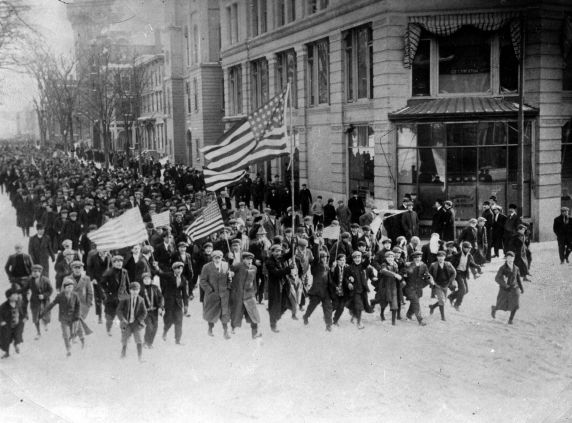
Who is the working class?
In order to make the things that we need for our lives, two things are required. They are labor power and the “means of production.” Labor power is the ability of a worker to do something. It could be making a sandwich or driving a school bus or writing computer code, or anything else that workers do. The “means of production” is everything the worker needs in order to do the job. In a sandwich shop, means of production would be things like the building, the ingredients, the cash register, tables and chairs – everything needed in order to prepare and sell and serve the meal so the customer can eat it.
Under our capitalist economic system, a pretty small percentage of people own these means of production. They are called owners, or bosses or “the ruling class.” All of the rest of us, who don’t own the means of production and must sell our labor power to the bosses so we can earn money to live, are in the working class.
It doesn’t matter what type of work a person does, or how much money she makes. If she doesn’t control the means of production, she is part of the working class.
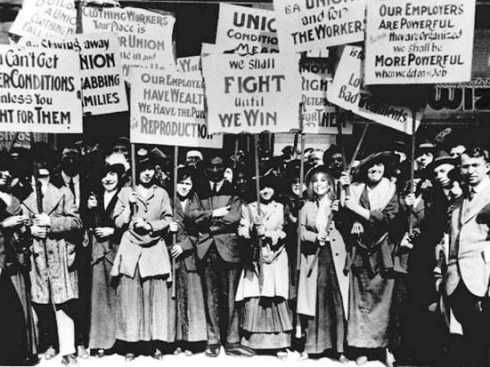
Why is the working class important to socialists?
Working class people can have it pretty rough. We have to show up when the owners want us to show up. We have to do what we’re told. If we don’t, we might be fired from the job and not have money to buy the things we need in order to live. For a lot of workers, it’s a struggle every day to keep our jobs and earn enough to survive. It’s especially hard for people with limited education and skills, for single parents, or for anyone with extra challenges in their lives. Lots of times people have to choose between taking care of important things at home, and doing what they have to do to keep their jobs.
It seems like the bosses sort of have us in a bad situation. Since they own the means of production, they can order us around and we pretty much have to do what they say. Some owners (or the managers they hire) are nice people, and try to treat their workers with kindness and respect. Still, the worker always knows that he has to do what the boss says or he might lose the job.
So, how can a group of people like the working class, who seem so powerless, be the ones to transform society? If we have to do what the bosses say, how can we possibly lead anyone to a better world? It’s because the working class has a secret super power. The power is called solidarity.
Although an individual worker may be powerless to defy the owners, when workers stand together in solidarity, they can change the world. The ruling (owning) class is so small, that they can’t possibly do the work themselves. Without the workers, no work gets done.
When workers decide together to stay off the job until their demands are met, it’s called “going on strike.”
Think of your favorite sandwich shop. If all of the workers decided not to show up to work, there would be nobody there to make the meals, to clean the tables, or to take the orders.
Or think about an owner of a bus company. She would be sitting alone in a parking lot full of empty busses if the drivers decided not to come to work. Without the working class, everything in society stops.
So when workers stand together in solidarity, they can show the bosses that it’s really the workers who have all the power – in the workplace and in society. But it’s only when they stand together as one that this becomes the truth.
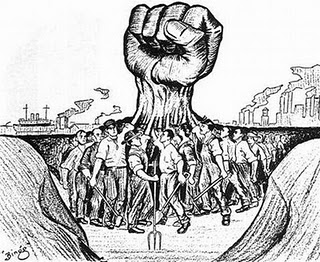
What can solidarity do?
When workers join unions, and stand in solidarity together to make demands, they can get the bosses to pay attention and give in. In fact, before the struggles of unions in the early 1900s, people sometimes had to work fourteen hours a day or more, six or seven days a week. Workers formed unions and went on strike to demand an eight-hour work day. Later, they demanded higher wages, and benefits, such as vacations and health insurance and days off when they’re sick. These things that so many of us enjoy and take for granted today were not given by the owners simply because they wanted to be nice. They were won by the workers who stuck together and demanded them.
Workers can demand and win things like better hours, better working conditions and higher wages for their own jobs. But they can also work in solidarity to make a better society for everyone. Unions have fought for things like an end to child labor, laws regulating workplace safety, a minimum wage for all workers (even ones not in unions), Social Security benefits for retired workers, and so much more.
Working Class Solidarity for a Better World
For socialists, the goal is a society where we do away with the ruling class owners altogether. In a socialist society, the workers would control the means of production, and would share in all the decisions about what to produce and how the work should be done. There wouldn’t be an owner to boss people around. We would rule ourselves in fairness and equality. We would do this because we’re all in the same boat. In the words of the Wobblies (a union that started more than a hundred years ago) “an injury to one is an injury to all.” We would all stand up together in solidarity for a just and equal share of society’s bounty and an equal say in society’s decisions.
So yes, my dear. We are a working class family, and proud of it. It’s up to us to always show our solidarity with other workers, and to fight together with them for a better life for all of us.
In the words of the famous socialist and philosopher Karl Marx “Workers of the world, unite. You have nothing to lose but your chains!”
Brian K. Noe · ·
Our sisters and brothers who are hospital workers, home care workers, airport workers, fast food workers, nursing home workers and retail workers deserve a living wage and union rights. Support the Fight for $15 on strike today.
Brian K. Noe · ·
Chicago’s streets were a sea of union red last Friday for a day of action to protest the austerity policies of Rahm Emanuel and Bruce Rauner.
I’m proud to have joined twenty thousand souls at the Thompson Center that day. What struck me, once again, was the broad support and solidarity in this movement. It wasn’t just teachers, or students, or parents, or union folks. We were joined by activists from Fight for 15, Black Lives Matter, the LGBTQ community, immigrant rights groups, neighborhood and community organizations and so many more. It’s always an inspiration to see.
Here are some great photos of the day from Bob Simpson.
You can also read this report from Gala M. Pierce: Striking for the city we deserve | SocialistWorker.org
Brian K. Noe · ·
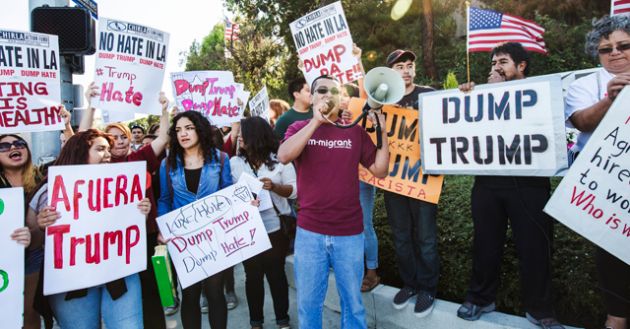
I keep reading articles with teasers like this in the title, but none seem to actually lay out any semblance of a plausible strategy. They make the case for doing something, with hypothetical (and often frantic) questions about what people might have done during Hitler’s rise to power, but then are incredibly thin on actual advice for what we should do here and now. This left me frustrated and depressed, until I realized that I shouldn’t wait for someone else to tell me what I needed to do. I should think about it and come up with a plan myself. So I did, and I have.
First, the caveats. Although the strategy outlined here truly is simple, it’s not easy. Some of it will require a great deal of hard work, dedication and sustained resolve. Even with all of that, success may seem evasive if not elusive.
Also, it needs to be said that I’m not a sociologist, historian, data analyst or professional political strategist. All I can offer is the work of an informed and engaged mind.
Finally, do not read this expecting a foolproof plan for keeping Donald Trump out of the White House in 2016. That would be one desired outcome, but it’s not the main goal. The main goal is to defeat not only Trump, but “Trumpism.” If we can pull that off, then it won’t matter nearly as much who resides at 1600 Pennsylvania Avenue, because we will also have ushered in a new era in American politics where the people call the shots.
I don’t know if Trump’s rise is really comparable to Hitler’s. He’s certainly brought some of the most despicable and frightening tendencies in the body politic of our nation into the light of day. Whether or not he is the Antichrist of our era, in the vein of Hitler and Napoleon, it is crucial that we stand up to the racism, religious bigotry, warmongering, red-baiting, anti-intellectualism and other assorted evils and asshattery he proclaims. We must stand up, we must fight, and we must win.
So, take a deep breath, grab a cup of coffee (or a tumbler of whiskey), and consider the following step-by-step outline for banishing The Donald to the footnotes of history.
Forget about the Presidential Election of 2016.
Okay, you don’t have to forget about it completely. But you do have to think beyond it. Part of the problem with our politics in this country is that every few years we get all wrapped up in election campaigns, we put all our energy into them, and that steals attention and resources from important things that we ought to be doing day in and day out in our own communities. If all you do is vote and encourage others to do so, we’ve already lost. Some of the most effective activists I know don’t vote at all, despite all of the hoopla and constant berating messages like “if you don’t vote, you can’t complain.” I vote, and I pay special attention to local and state races. I don’t discourage people from voting, but it is not the only thing. It’s not even the most important thing.
Do I really need to say it? CHICAGO.
On the evening of March 11th, the people of Chicago already showed us what to do. We will need to organize and mobilize thousands of people in all of our major cities who are willing to get out in the street and shut things down. This is important between now and November, but will be even more crucial after November should Trump prevail. Please note that what happened in Chicago was possible because of years of organization and struggle there, and because of the incredible spirit of solidarity in the town. Black Lives Matter supports the teachers. The CTU supports the Fight for Fifteen. Fight for Fifteen stands tall for immigrant rights. Each one of the significant social movements in the city recognizes the relationship between the other fights for justice and their own. This is why they were able to put their stunning demonstration together in less than a week. If you’re not organizing together with others in your community already, get to it.
Give the people what they need.
Donald Trump did not create his base. People know in their hearts that we’re all getting cheated and deceived by the ruling class in this country. We know that our political leaders present little but lies and empty promises. We know that they have no solutions. Neither the neoliberalism of the Democrats nor the corporate cronyism of the GOP offers a way forward to decent lives in the future. Defending the status quo or the lesser of two evils will not stem the current tide of lunacy. People who are frustrated and frightened are looking for real hope and real help.
Trump’s message is simple: authoritarian, nationalistic and populist. His mantra of “they’re killing us on trade” because our leaders aren’t strong and don’t know how to negotiate, resonates with people facing economic hardship (real or anticipated) after nearly four decades of neoliberalism.
Those of us who care about defeating Trump and his ilk must present a powerful, plausible alternative. More of the same won’t cut it.
Strike a blow for liberty. Screw the Democrats.
If we are to present an attractive alternative to Trump and his message, it will require an independent political movement of the great masses of working folks, and a willingness to break with the Democratic Party. Hillary Clinton’s campaign, in particular, is a dead end. Showing any support for Clinton, either now or in the general election campaign, will be counterproductive. Whether or not she might beat Trump in 2016 is one question, but in the long run she cannot defeat Trumpism. Supporting her candidacy is not only wasted effort, it is destructive. This goes for any other Democrat who isn’t campaigning hard for things that will make a real difference in our lives and in the lives of our children. Things like single-payer universal health care, free tuition at public universities, a $15 minimum wage, higher taxes on Wall Street, opposition to big oil and smashing the oligarchy are a damned good list, for starters – and that brings me to my final point.
Support the Anti-Trump.
Despite my reasoned and heartfelt condemnation of the Democratic Party, as long as Sanders is in the race for their Presidential nomination, he will have my support. As far as the election of 2016 goes, he has been the single visible Trump antidote. Every day that Bernie is out there railing against the corporate stranglehold on our lives, it’s another opportunity for people to wake up and to feel a sense of what might be possible if thoughtful, decent people came together in large numbers to demand thoughtful, decent government. Although his populist economic message is similar in some ways to Trump’s, his prescriptions are sound. It is obvious that the Democratic Party does not share his zeal for economic justice, and his own foreign policy framework leaves a lot to be desired, but Sanders is focusing the public’s attention on issues and solutions that would have been left out of the discourse entirely absent his campaign. We can build on that, and we should do what we can to see that his message continues to be heard.
More than anything else, our opposition to the darkness in American politics must be based on real solutions, and on a willingness to get off our couches and out into the streets in pursuit of those solutions. Our determination and steadfastness in this effort may literally be the difference between life and death for many of us – perhaps even for humankind. In some ways I’m thankful to Donald Trump for shocking us out of our complacency.
Now let’s go kick his ass.
Brian K. Noe · ·
combinations together
meaning of means
feel the room
we swayin’
everyone:
resistance together…works
the time connection
strange
expected that
everyone together, connected
hope gently
Brian K. Noe · ·
With public attention focused on the railroads in a way it hasn’t been for decades, the cross-craft solidarity group Railroad Workers United is seizing the opportunity to teach the general public “railroading 101”—and teach rail workers “environmental politics 101.”
Read More: Rail Workers and Environmentalists to Teach Each Other | Labor Notes.
Brian K. Noe · ·
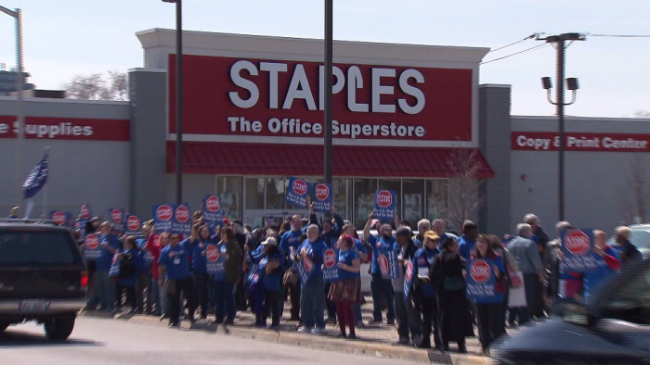
It was one of the pleasures of my life to join together with union sisters and brothers on Saturday to protest the plan to outsource mail services to Staples stores.
Several hundred of us came to the Staples in Elmwood Park for the protest.
Follow these links for more information.
Community and Postal Workers United
Brian K. Noe · ·
The Chicago Teachers Union is currently on the front lines of a fight to defend public education. You can show your support by making a contribution to their Solidarity Fund. Every dollar helps.
If you care about the future of public education in America, take a few minutes to read The Schools Chicago’s Students Deserve – a new study from the CTU which argues in favor of proven educational reforms to dramatically improve the education of more than 400,000 students in this district of 675 schools.
Brian K. Noe · ·
On May Day 2012, I’ll be joining in solidarity with workers around the world for “A Day Without the 99%.” My plans are simple: to spend the day in reflection, and perhaps share some appropriate music and movies with my children. I hope that next year I’ll be able to be in the company of Fellow Workers in Chicago for the day, but that’s simply not possible this year.
If, like me, you grew up without knowing the significance of May 1st to the working class, you might find some of these articles of interest as we prepare to celebrate International Workers’ Day 2012.
What is May Day and why is it called International Workers’ Day? [IWW.org] – May 1st, International Worker’s Day, commemorates the historic struggle of working people throughout the world, and is recognized in every country except the United States and Canada. This is despite the fact that the holiday began in the 1880’s in the United States, with the fight for an eight-hour work day led by immigrant workers.
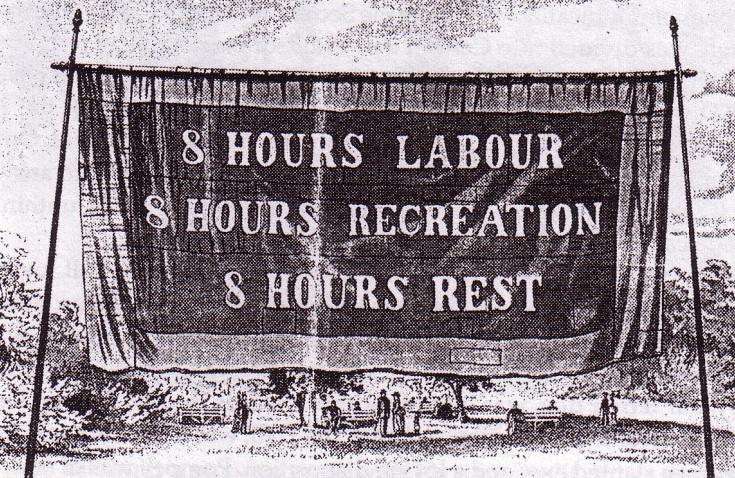
Building on May Day traditions today. [SocialistWorker.org] – On May 1, workers across the globe will demonstrate, attend meetings and go on strike in celebration of International Workers Day, a working-class holiday with origins in the U.S. more than a century ago. With class inequality reaching new heights and shaping politics in the U.S. and internationally, a new generation is discovering the importance of May Day and embracing its message of militant working-class struggle and international solidarity.
A Short History of International Workers’ Day. [Holt Labor Library] – May 1, 1886, became historic. On that day thousands of workers in the larger industrial cities poured into the streets, demanding eight hours. About 340,000 took part in demonstrations in Chicago, Milwaukee, Detroit, Cincinnati, St. Louis, Baltimore, Washington, New York, Philadelphia, Boston and other places. Of these nearly 200,000 actually went out on strike.
The Haymarket Affair. [Illinois Labor History Society] – No single event has influenced the history of labor in Illinois, the United States, and even the world, more than the Chicago Haymarket Affair.
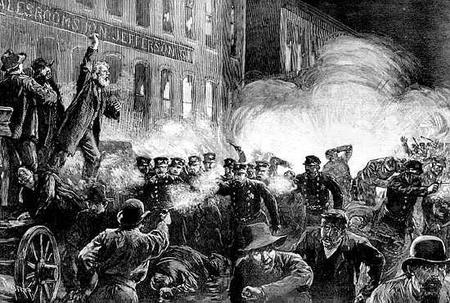
The McCormick Strike and the Haymarket Tragedy. [The Autobiography of Mother Jones | IWW.org] – “The police without warning charged down upon the workers, shooting into their midst, clubbing right and left. Many were trampled under horses’ feet. Numbers were shot dead. Skulls were broken. Young men and young girls were clubbed to death.”
Addressing Objections to Occupy May 1st. [IWW.org] – There have been a number of objections or concerns raised about the May 1st, 2012 general strike. Juan Conantz attempts to briefly address some of the most common ones.